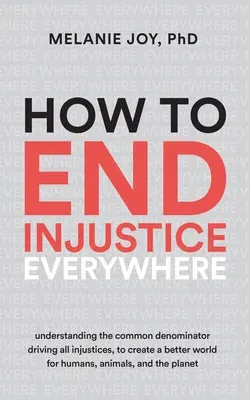In How to End Injustice Everywhere, psychologist Melanie Joy reveals
the common denominator driving all forms of injustice and offers both an
examination of unjust systems and behaviors as well as practical tools
to help raise awareness, reduce infighting, and build more resilient and
impactful justice movements.
In her newest book, How to End Injustice Everywhere, psychologist
Melanie Joy reveals the common denominator driving all forms of
injustice, from sexism to speciesism to abusive interpersonal
relationships and group dynamics.
Joy explains that all injustices--such as racism, patriarchy, animal
exploitation, environmental degradation, and domestic abuse--share a
common denominator, which is relational dysfunction, or dysfunctional
ways of relating: to other individuals, between social groups, and to
nonhuman animals and the environment.
Relational dysfunction stems from a particular psychology, a
"nonrelational mentality." This mentality causes us to think, feel, and
act in ways that violate integrity, harm dignity and lead to unjust
power imbalances. Joy sheds light on the nonrelational mentality and
explains how it shapes and is shaped by the various oppressive, or
"nonrelational" systems in our world that cause widespread injustice.
Until those of us who are helping to bring about justice understand
relational dysfunction and know how to change it, we risk recreating
injustice even as we work to end it, and our movements are at risk of
cannibalizing themselves.
How to End Injustice Everywhere is a call for anyone working
toward justice for humans, animals, or the environment to unify behind a
shared "metamission" of creating a more relational world. The book
provides an empowering and unique approach to ending injustice, and it
offers not only an examination of nonrelational systems and behaviors,
but also practical tools to help raise awareness, reduce infighting, and
build more resilient and impactful justice movements.

